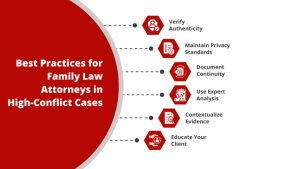For example, almost 50% of marriages in the U.S. that involve children ultimately end in divorce. This situation impacts about 21.9 million children under 21, most of whom end up living primarily with one parent. Such a high rate of divorce frequently results in custody disputes, highlighting the increasing complexities in family law.
Texts, emails, and social media posts can significantly influence custody decisions, highlighting the need for attorneys to manage this evidence with great care.
As digital interactions become increasingly commonplace, your methods of gathering and presenting this evidence must evolve. Updating your skills is essential to keep pace with these changes continuously. Attending professional development events, such as the Destination CLEs conference in Las Vegas, offers an excellent opportunity to deepen your legal knowledge. Attending these sessions helps to update your skills and keeps you at the forefront of legal practice and tackling any challenges in the dynamic world of family law.
In this blog, we’ll explore the role of digital evidence in family law and provide strategies for effectively managing high-conflict cases so that you can handle and use digital data to strengthen your legal arguments and outcomes.
Understanding Digital Evidence
Digital evidence is data stored or transmitted digitally, such as emails, transaction records, social media posts, and browsing history. The Federal Rules of Civil Procedure, particularly rules 16, 26, 33, 34, 37, and 45, dictate that for digital evidence to be admitted in court, it must be proven relevant, authenticated, and intact. Here’s what you need to ensure about your digital evidence:
- Originality: Keep the original version of messages, webpages, and search history.
- Metadata: Gather essential details, such as when messages were sent or created, when they were received, and who sent them.
- Integrity Proofs: Use digital signatures and timestamps to confirm the data hasn’t been tampered with.
- Storage Requirements: Store data in a format that allows you to write it once but read it many times, which helps prevent any changes.
- Preparation for Discovery: Arrange your data in a specific format that makes it easy to process during electronic discovery.
The Impact of Digital Evidence on Family Court Cases
Here’s how digital evidence is reshaping the outcomes of family court cases and becoming an essential factor in modern legal disputes.
Text Messages
Text messages are increasingly used in divorce cases to provide insights into personal relationships. Since texting is a standard communication method, these messages can reveal much about someone’s daily life and interactions with others.
Courts often consider text messages when deciding on child custody or how to split assets. Text messages can show what someone was thinking or planning at a particular time, offering a clearer picture of their behavior and intentions. For instance, texts could show how a person manages money or interacts with their children, affecting decisions about money matters and custody arrangements. It’s crucial to consider these messages in their full context to ensure they’re represented accurately in court.
Surveillance Footage
Surveillance footage is a reliable source of evidence showing exactly what happened during interactions and incidents, making it very important in domestic disputes or child custody cases. This type of footage helps the court see the true events because it captures clear and detailed images, unlike witness accounts, which personal opinions can influence.
Social Media
Social media platforms are rich sources of personal information. In family law, these platforms can expose truths about a person’s lifestyle, relationships, and actions that are relevant to the case. Posts, pictures, and comments can prove or disprove what someone has said in court about where they were or how healthy they are. Social media can establish timelines that corroborate or question testimonies given in court.
In Dexter v. Dexter, social media content was used to challenge custody arrangements. This case highlighted how online behavior, such as blog posts discussing lifestyle choices, could impact custody decisions about who is more fit to care for the children.
Electronic Records
Emails and digital records of transactions are solid proof of conversations and dealings between people. These records can prove or disprove what has been claimed in court about money matters or other personal communications. They provide a clear record with dates and times that can be very important in resolving disputes in family law cases.
Integrating Digital Evidence in High-Conflict Family Law Cases
Digital evidence can solidify a client’s position by providing facts about relevant events or behaviors. Here’s how you can effectively utilize digital evidence across different types of disputes:
Child Custody Disputes
Your careful analysis of texts, emails, and social media posts is invaluable in child custody battles.
- These digital communications provide clear insights into parents’ daily interactions and behavior. For instance, text messages between a parent and child can showcase the parent’s involvement or lack thereof in the child’s daily activities.
- Similarly, inappropriate or aggressive posts on social media can call into question a parent’s suitability for custody.
- Collecting digital records allows you to build a strong narrative supporting your custody or visitation rights case.
Financial Disputes
Financial disagreements during divorce proceedings are common, especially about splitting assets. Digital records like online banking statements, transaction logs, and digital receipts can be vital.
They can reveal hidden assets or money that wasn’t previously disclosed. For instance, these records might reveal secret purchases or unknown sources of income. Gathering and presenting this information carefully is important to ensure that assets are divided relatively as the court decides.
Domestic Violence Cases
You can integrate digital evidence in a domestic violence case as :
- Text messages, emails, and voice recordings can provide solid evidence of threats or harassment.
- Online activities, like social media posts or location tracking, can also prove stalking or intimidation.
However, when using this evidence, it’s essential to show the messages or posts and a repeated pattern of this abusive behavior.
Best Practices for Family Law Attorneys in High-Conflict Cases
Here are effective strategies that can help attorneys manage these challenging cases:
Verify Authenticity
Always ensure that the digital evidence you plan to use is authentic. This includes verifying the source of emails, texts, and social media posts. Establishing authenticity is crucial as it can affect the evidence’s admissibility in court.
Maintain Privacy Standards
Be mindful of privacy laws related to digital communications. Ensure you have the legal right to access and use the information you collect, especially when dealing with sensitive data.
Document Continuity
Keep a thorough record of all digital evidence, documenting how it was obtained, stored, and handled. This log can prove that the evidence has not been tampered with and remains in its original form.
Use Expert Analysis
When dealing with complex data that requires detailed analysis, consider hiring digital forensics experts. These professionals can help extract, preserve, and interpret data, providing clear insights that strengthen your case.
Contextualize Evidence
When presenting digital evidence, such as text messages or social media posts, provide context to show how it relates to the custody dispute. Demonstrating the relevance of the evidence can make it more impactful in court decisions.
Educate Your Client
Inform your client about the potential impact of their digital footprint on their case. Advise them on prudent online behaviors and the importance of maintaining appropriate communication during the custody dispute.
By implementing these strategies, attorneys can manage high-conflict family law cases more effectively, ensuring their clients are well-represented and supported.
Are You Looking to Enhance Your Legal Expertise with Recent Developments in Law?
Attending conferences can significantly enhance your legal expertise and keep up with the latest trends. Learning should be a rewarding experience. Nowadays, organizations like Destination CLEs are redefining the typical CLE experience by offering immersive educational “vacations” in stunning locations.
Why opt for these unique CLE opportunities? You’ll meet your educational requirements and turn learning into an exciting adventure. Such experiences offer valuable networking in dynamic settings and the chance to explore new places that refresh your mind and perspective.
Connect, Learn, and Grow: Elevate Your Legal Expertise with Destination CLEs
Destination CLEs redefine the way legal professionals meet their continuing education requirements. Our conferences blend educational opportunities with cultural immersion in some of the world’s most captivating cities.
Why Choose Destination CLEs?
- Meet CLE Requirements: Fulfill your mandatory CLE credits through engaging, high-quality seminars in stunning global locations.
- Transformative Learning: Turn the usual lecture-based learning on its head by engaging in sessions as dynamic as the destinations.
- Networking Opportunities: Connect with peers worldwide, expanding your professional network in settings that encourage collaboration and growth.
- All-Inclusive Experience: Enjoy comprehensive packages that cover educational sessions, accommodations, and unique cultural experiences, making your learning adventure seamless and memorable.
- Efficient Credit Earning: Earn required CLE credits efficiently, with schedules that balance professional development and exploration.
Plan your next educational journey with Destination CLEs and ensure extraordinary professional development. Our 2024-2025 lineup includes diverse locales such as Lisbon, Puerto Vallarta, Dubai, Havana, and an Alaska Cruise—each offering a distinct blend of legal education and local culture.
Secure your spot today and become part of a community dedicated to professional growth and networking.
DestinationCLEs.com is a participant in the Amazon Services LLC Associates Program, an affiliate advertising program designed to provide a means for sites to earn advertising fees by advertising and linking to Amazon dot com.











